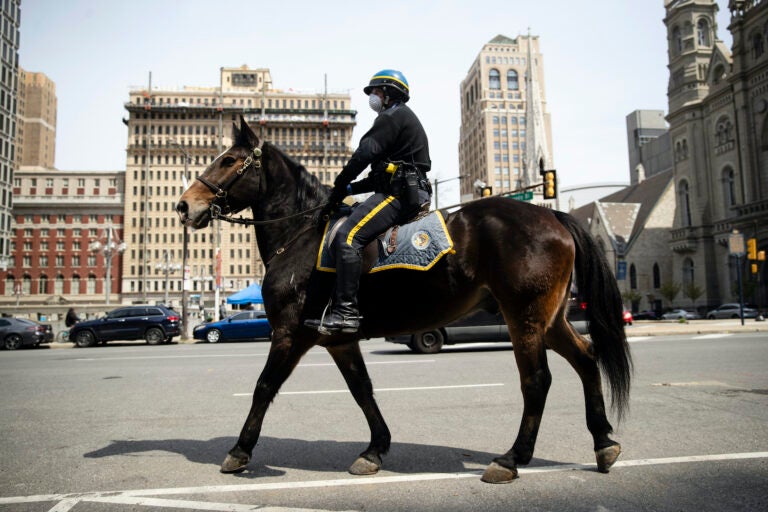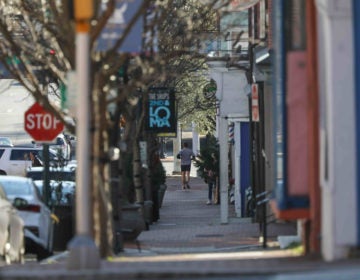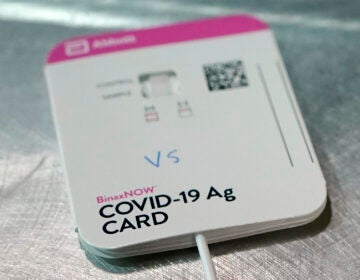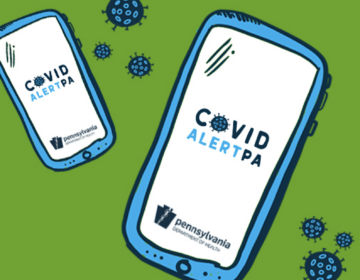Coronavirus update: Pa. Gov. Wolf lays out reopening plans
On Wednesday night, Pennsylvania Gov. Tom Wolf laid out more details of his measured step-by-step plan to reopen the state starting May 8.

A mounted police officer patrols while wearing a protective face mask as a precaution against the coronavirus in Philadelphia, Friday, April 17, 2020. (AP Photo/Matt Rourke)
Updated at 8:32 p.m.
–
Are you on the front lines of the coronavirus? Help us report on the pandemic.
As of Wednesday afternoon, there are 36,631 confirmed COVID-19 cases in Pennsylvania, 95,865 in New Jersey, and 3,200 cases in Delaware. Philadelphia has 10,643 cases.
Pennsylvania’s death toll stands at 1,680, New Jersey’s at 5,063, and Delaware’s at 89. Philadelphia’s death toll is 423.
Gov. Wolf lays out reopening plans
On Wednesday night, Pennsylvania Gov. Tom Wolf laid out more details of his measured step-by-step plan to reopen the state starting May 8.
The plan will ultimately be divided in three phases, which Wolf said won’t happen all at once and don’t have a set timeline.
“Just as we closed out in a phased way, we’re going to be reopening in a phased way,” he said.
The first phase, the red phase, is the one the state is in now. Only life-sustaining businesses are allowed to remain open and strict social distancing measures are in place.
Next comes the yellow phase, which allows retail to open but continues to limit gatherings of up to 25 people. Businesses should allow for telework, if possible, and certain protections will remain in place. Schools remain closed for in-person instruction as well as in-person recreation such as gyms.
Restaurants are still limited to pick-up and delivery in this second phase.
Northwest and North-central counties such as Tioga and McKean could be the first to move from the red to green phase because of their low case counts.
The state has partnered with Carnegie Mellon University, which has created a tracking tool designed to track how opening up the economy affects infection rates and economic conditions.
The final green phase would lift any remnants of the stay-at-home orders while observing any recommendations from the state’s health department and Center for Diseases Control guidelines. For example, should the agencies recommend that people keep masking, then it’s something the state would follow.
“The virus determines how we do this,” said Wolf.
The key benchmark for a county or region to reopen will be 14 days with an average of less than 50 cases per 100,000 individuals.
Testing rates, the ability to investigate cases, contact tracing capabilities and proximity to high risk settings will also play a role, said Wolf.
The process of reopening has already begun, said Wolf. Online car sales resumed on Monday and all construction will resume operations on May 1.
“I will caution that we may announce a target date that will have to be pushed back due to new cases or we might reopen some areas or some business only to have them close again if the virus begins to resurge,” said Wolf.
Philadelphians demand better handling of unemployment claims
A group representing Philadelphians who’ve lost work is calling on the state to provide more timely information about unemployment claims.
The Philadelphia Unemployment Project is calling on Governor Tom Wolf to hire more staff for unemployment compensation service centers.
“We have found it impossible to get through for information on our claims on telephones, chat or email. Many of us have not received the PIN numbers that we need to apply for benefits,” wrote a group of 83 people who identified as recently laid-off in a letter to Governor Wolf. “The unemployment service must ANSWER THEIR PHONES.”
Since the coronavirus shutdown began in the third week of March, more than 1.5 million Pennsylvania residents have applied for unemployment benefits. Some are receiving that cash, plus an additional $600 dollars in federal stimulus a week, but many others complain that they have heard nothing back from the agency in charge of processing applications.
“People tell us they’ve called 400 times in a day, and [were] never answered,” said director of the Philadelphia Unemployment Project John Dodd. “We think the minimum that should be done is the state should put a whole lot more phone lines in.”
On a call on Monday, Secretary of Labor and Industry Jerry Oleksiak said that 70 retired staff had been brought back, and the department had hired another 100 people to bring on by mid-May. “We are doing what we can to improve our response time,” he said.
The Governor’s office has not yet responded to a request for comment on the letter or delays.
Quarantine bright spot? Philly’s got cleaner air. Downside? Plastic bag ban pushed to 2021.
Coinciding with the 50th anniversary of Earth Day, a new report published by the city Wednesday found three air pollutants have dropped since state ordered shutdowns meant to mitigate the spread of COVID-19.
The Health Department’s Air Management Services published a report that found nitrogen dioxide and fine particulate matter, which can aggravate residents with asthma, have dropped 22% and 18 % respectively. Carbon monoxide levels dropped by 25%.
But the COVID-19 outbreak is delaying an environmentally conscious effort to ban single-use plastic bags.
The ban was set to take place July 2 but Mayor Jim Kenney said that start date is unrealistic under the pandemic. On Wednesday, he moved the start of the ban to January 1, 2021.
“This is not an announcement we want to make during Earth week,” said Kenney. “We know the climate crisis and plastic pollution remain two very serious threats to our planet and society even during a global pandemic.”
Once again, Kenney asked residents to not toss personal protective equipment, such as gloves, on sidewalks.
Montco starts reporting probable COVID-19 deaths
A day after the state’s top health official started to include the number of probable COVID-19 deaths in her daily briefings, Montgomery County started to do the same.
“In an effort to be transparent and share with you what we have as much as possible, we’ve been working for the past several days to get two lists together,” said Dr. Valerie Arkoosh, chair of the Montgomery County Board of Commissioners Wednesday.
One of the lists will include the total number of confirmed COVID-19 deaths, meaning the patients were lab tested and confirmed COVID-19 cases.
The other list will include fatalities that never got a lab test back either because the patient died in their home or the facility they were in wasn’t able to provide one.
On Wednesday, Arkoosh announced 106 new COVID-19 cases bringing the county’s total number of cases to 3,093 — ten of the cases were in children under 19, including one nine month old.
Two more residents who had been confirmed positive for COVID-19 died, bringing the total number of confirmed fatalities to 174.
Arkoosh said an additional 77 people were probable COVID-19 fatalities, bringing the county’s death toll to 251 people.
To date, 62% of deaths have been among people in a long-term care setting, a hotspot for outbreaks in the state.
Delco furloughs 400 employees
Hundreds of Delaware County employees who cannot work remotely were placed on temporary unpaid leave starting this week.
“It’s a decision we made with a great deal of reluctance, deliberation,” said County Councilmember Kevin Madden of the move to put one-eighth of the 3,200 county employees on furlough. “Knowing what circumstances we’re all in right now, it’s not something we really wanted to do.”
Still, like many businesses, the county has seen revenues negatively impacted amid mandated business closures needed to mitigate the spread of COVID-19.
Madden said the 400 furloughed employees are those who can’t work from home, such as court administrators, because of the public-facing nature of their jobs and the fact many court cases have been suspended.
Earlier this month, the Gov. Tom Wolf’s administration froze the paychecks of 9,000 state employees citing similar telework and revenue issues.
Delco is the first local government in the Philadelphia region to make such cuts.
Park police and the county’s 911 call center did not see any furloughs, according to Madden, because they’re working “with all hands on deck.”
“We ultimately have to be stewards of the taxpayer. We have to make sure that we are making sure that the finances of the county are healthy,” said Madden, adding the employees will still have access to their health care and won’t have to pay the contribution to their premiums.
Pa. offers some loan deferments for businesses
As COVID-19 mitigation measures keep non-life-sustaining businesses closed, the Wolf administration is offering some additional relief for any business owners with loans from some of the state’s economic development agencies.
Payments on loans taken out through the Pennsylvania Industrial Development Authority, the Pennsylvania Minority Business Development Authority, and the Commonwealth Financing Authority (with the exception of PENNWORKS loans) will be deferred for three months, starting with April.
Loans from the latter two agencies are also pausing interest accrual during the months-long deferment.
“Businesses statewide have been cooperative and made sacrifices for the health and safety of their communities, and we are committed to supporting them through the next steps ahead,” said Department of Community and Economic Development Secretary Dennis Davin.
As state reconciles data, more cases tied to Philadelphia
Philadelphia reported a significant increase in COVID-19 cases Wednesday, reporting 615 new cases, bringing the total to 10,643 COVID-19 cases.
Philadelphia Health Commissioner Thomas Farley said some of the new cases are more than 10 days old. The delayed reporting comes as the state continues to clean up case data and assigns cases to their corresponding county.
“A level case count continues to indicate that we’re making progress with our social distancing,” he said. “We’re no longer seeing the sharp increases we saw in the past. Still though, over 400 cases a day is many cases.”
Those in congregate settings continue to be ravaged by COVID-19.
Of the state’s 429 total deaths, which includes 29 new deaths reported Wednesday, 52% are among nursing home residents.
Five new positive cases were reported in Philadelphia jails, bringing the total number of active cases to 53.
Farley said Philadelphia hospitals continue to see increases in COVID-19 cases, currently treating 949 such patients.
Still, 31% of patient beds remain available, as well as 26% of ICU beds.
Temple University Liacouras Center, which is being used as a COVID-19 surge facility, has admitted six patients to date and expects more patients Wednesday.
Due to COVID-19, the single-use plastic bag ban set to take place July 2 is moved to January 1, 2021.
Pennsylvania continues to see slowing of day-to-day rate increases
The state saw 1,466 new cases Wednesday, a 4.1% increase in total cases from Tuesday. Pennsylvania also experienced 85 additional fatalities, one of the lowest day-to-day increases since last Friday.
More than half of the state’s fatalities – 845 total – have been among nursing home or personal care facility residents.
So far, 5,337 residents in 407 of these long-term care facilities have tested positive for COVID-19. Additionally, 617 employees in these facilities have tested positive.
WHYY’s Laura Benshoff contributed reporting.
WHYY is your source for fact-based, in-depth journalism and information. As a nonprofit organization, we rely on financial support from readers like you. Please give today.



![CoronavirusPandemic_1024x512[1]](https://whyy.org/wp-content/uploads/2020/03/CoronavirusPandemic_1024x5121-300x150.jpg)



